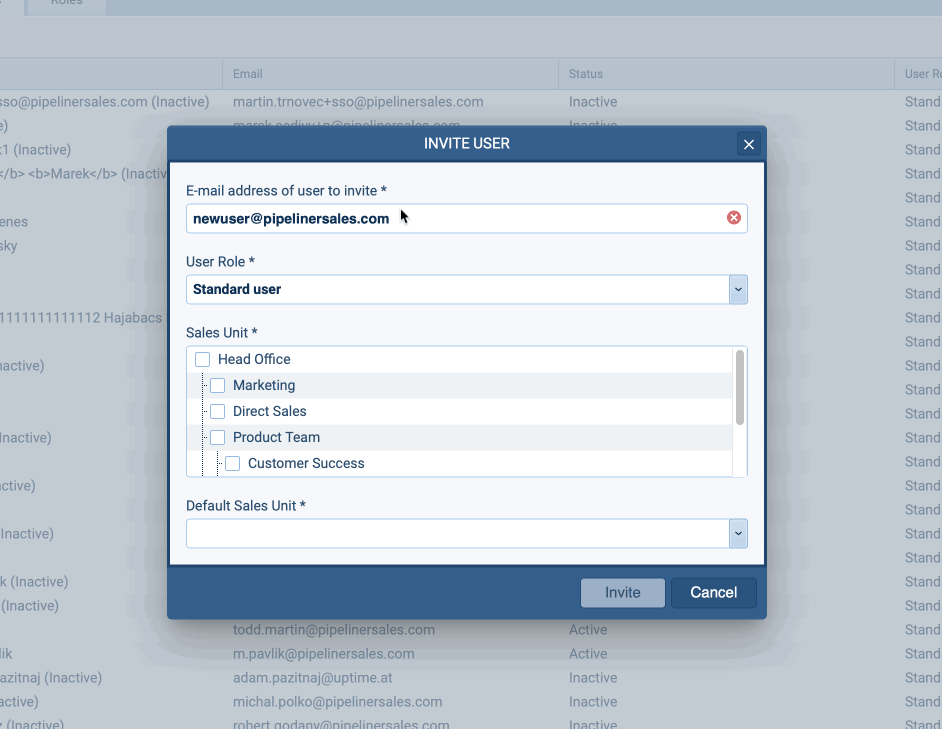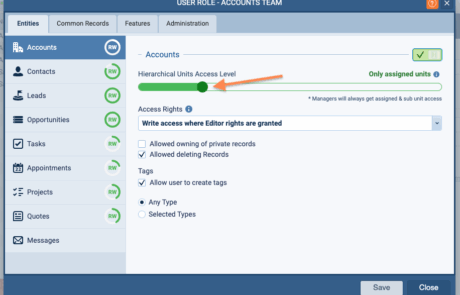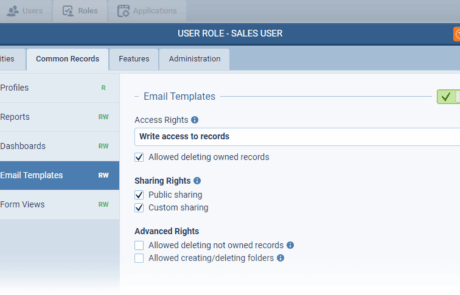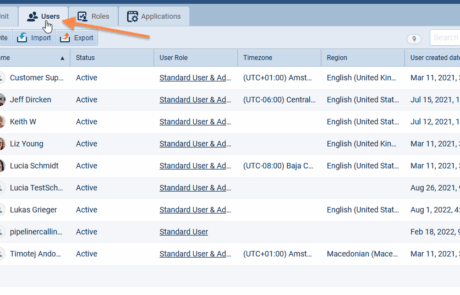The secret to a successful, scalable CRM lies in granular control. Pipeliner CRM’s UserUser User means a person who uses or consumes a product or a service, usually a digital device or an online service. Roles and Access Permissions feature transforms complex security frameworks into a seamless, performance-driving tool. Stop worrying about who sees what and start focusing on closing deals. Secure, compliant, and perfectly aligned with your organizational structure.
Security That Drives Sales Performance
Control is your greatest asset. Pipeliner CRM ensures dataData Data is a set of quantitative and qualitative facts that can be used as reference or inputs for computations, analyses, descriptions, predictions, reasoning and planning. integrity by restricting access to sensitive information to authorized personnel only. Our Granular Access Rights define read/write levels for every user and record type, protecting your competitive edge and maintaining regulatory compliance. As your team expands or shifts, Pipeliner CRM scales with you, offering seamless scalability. You can instantly reassign all data (Accounts, Opportunities, Activities, etc.) from one user to another, eliminating administrative overhead. Finally, boost operational efficiency; our Sales Unit Assignments reflect your real-world hierarchy, making reporting, filtering, and territory realignment fast, accurate, and foolproof.
Core Features: Precision Control at Your Fingertips
Smart Access Control
Forget one-size-fits-all security. Pipeliner CRM uses User Roles as a robust security templateTemplate Template is a generic file with a framework showing the standard sections or features of a specific kind of document, used to create a new document of the same type faster and easier., setting the foundation for every user’s experience.
- Role-Based Security: Assign a Role to instantly define a user’s access to records, features, and functions across the entire CRM and Admin portals.
- Hierarchical Unit Access: Define the breadth of access within your sales territories (Sales Units)—from ‘only my owned records’ to ‘all records within my assigned units’ or ‘all company data’.
- Manager Power: Grant Manager Rights within a Sales Unit to empower leaders to change ownership of any record within their unit, facilitating seamless coaching and territory management.
- Advanced Feature Control: Set granular permissions for common records, such as Reports, Dashboards, and Email Templates, to prevent unsanctioned sharing or deletion.

Effortless Data Management
Managing employee turnover or territory shifts shouldn’t be a crisis. Pipeliner CRM streamlines the process into an automated system.
- Instant Deactivation & License Release: Instantly remove access and free up a license when a user leaves, ensuring security is never compromised.
- Complete Data Reassignment: Use the powerful Reassign option to transfer 100% of the former user’s data—including Accounts, historical opportunities (Won/Lost), Contacts, and Activities—to a new owner in one click.
- Linked Record Transfer: When changing AccountAccount Account refers to a record of primary and background information about an individual or corporate customer, including contact data, preferred services, and transactions with your company. ownership, automatically transfer all associated Contacts, Leads, and Opportunities to the new Account Owner, maintaining data linkage and context.
Dynamic Organizational Alignment
Your CRM structure must mirror your sales organizationOrganization Organization is a cohesive group of people working together and formally bound by a shared identity (e.g., one team, company, club, etc.) and a common purpose (e.g., business growth, athletic victory, etc.).. Sales Unit Assignment makes it happen.
- Default Unit Creation: Automatically assigns newly created records to the user’s Default Sales Unit, ensuring perfect data categorization from the start.
- Territory Realignment: Seamlessly reassign records to a new Sales Unit when a deal is handed off, or use bulk actions to manage large-scale territory restructures (a lifesaver during organizational change!).
Some Other Highlights:
Filter options allow you to filter and view tasks, contacts, accounts, leads and opportunities based on any field.
Simple visual elements that help you organize Pipeliner by your own preferences. No coding needed.
You can grab any element and simply drag and drop it where you need it.
Frequently Asked Questions (FAQs)
The core benefit is gaining precise, flexible control over your CRM security and data visibility. It moves beyond a “one-size-fits-all” approach, allowing you to define precisely what data each user can view and what actions they can perform (such as editing, deleting, or creating records), which protects your sensitive data and boosts team productivity.
This is where Pipeliner delivers seamless continuity. When a user is deactivated, an administrator can use the “Reassign” option to transfer 100% of their data—including Accounts, Contacts, open/closed OpportunitiesClosed Opportunities Closed Opportunities is a general term encompassing closed-won and closed-lost opportunities., Activities, and historical records—to a new owner in one automated step. This eliminates the risk of losing critical sales context, ensuring every leadLead Lead refers to a prospect or potential customer (who can be an individual or organization) that exhibits interest in your service or product; or any additional information about such entity. and opportunity remains actively managed.
Absolutely. Our access control system is built around this capability. By assigning users to specific Sales Units (which mirror your company hierarchy) and defining their User Role, you dictate the scope of their visibility. For example, you can easily set a Role to ensure a user only sees records they own, or records assigned to their specific Sales Unit, guaranteeing focus and data security without administrative complexity.
The distinction provides essential control for leadership. A standard Member user can only edit and manage records they own (even if their Role grants them Write Access). However, a user with Manager Rights within a specific Sales Unit gains the crucial ability to change the ownership of non-owned records within that unit. This power is vital for sales leaders who need to reassign leads, balance territories, or coach their team without having to take ownership of every record themselves.
You can create a specific “Sales User” role that grants them the necessary Read/Write Permissions for their own day-to-day records (like Contacts and Opportunities) but restricts them from performing actions that could impact data integrity, such as:
- Restricting them from deleting records.
- Restricting them from deleting company-wide email templates or custom reports.
Learn More About Pipeliner CRM
Take a no-obligation 14 day trial of Pipeliner CRM.
No credit card info required – just experience for yourself how it could impact your sales.



